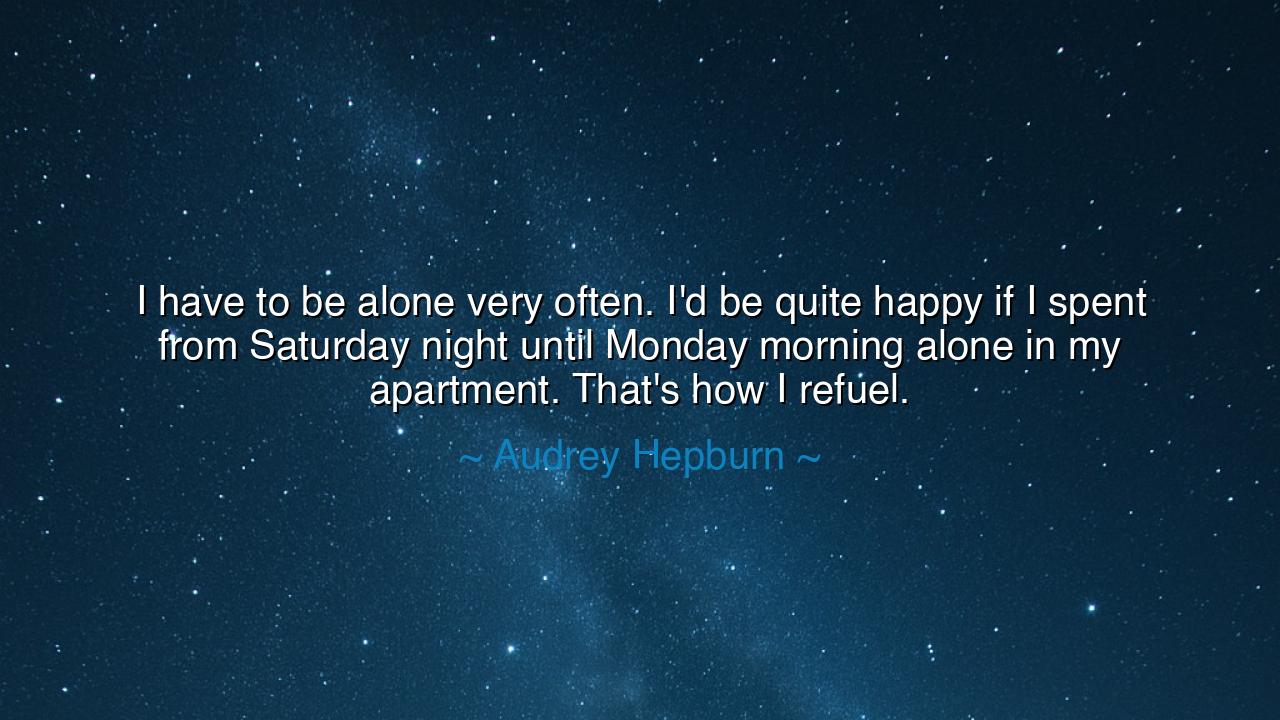
I have to be alone very often. I'd be quite happy if I spent from
I have to be alone very often. I'd be quite happy if I spent from Saturday night until Monday morning alone in my apartment. That's how I refuel.






Audrey Hepburn’s words, "I have to be alone very often. I'd be quite happy if I spent from Saturday night until Monday morning alone in my apartment. That's how I refuel," speak to the profound need for solitude and self-renewal. In a world that often pressures us to be constantly engaged with others, to socialize and maintain relationships, Hepburn's confession is a quiet rebellion—a recognition of the power and necessity of alone time. To refuel, to reconnect with one's own soul, is a process that requires retreat from the demands of the external world. Solitude, far from being a state of emptiness, becomes a sacred space for rejuvenation and self-rediscovery.
This idea of solitude as a source of strength has roots in ancient wisdom. The Stoics, including Epictetus and Seneca, understood the importance of personal time for reflection and the cultivation of virtue. Epictetus often spoke of the need to detach from the external world in order to find peace and clarity within. He emphasized that true freedom comes from the ability to live according to one’s own principles, free from the distractions of external opinions and demands. For the Stoics, solitude was a means of strengthening the mind and spirit, a necessary restoration that enabled them to return to the world with greater purpose and wisdom.
The life of Socrates, too, provides a rich example of the value of solitude. Though he spent much of his life engaging in public discourse, Socrates also believed in the power of reflection and self-examination. His famous dictum, “Know thyself,” underscores the belief that true wisdom arises not from external teachings, but from deep introspection. Solitude, for Socrates, was not a withdrawal from the world but a return to the self. He understood that in the quiet of one’s own thoughts, one could recharge, gaining the strength needed to engage with the world more meaningfully.
Similarly, the life of Leonardo da Vinci, the polymath and genius, demonstrates how solitude can serve as the fertile ground from which great creativity emerges. Though da Vinci was often engaged in projects for the courts of Italy, he would regularly retreat to moments of quiet reflection, spending hours in solitude to think, draw, and develop his ideas. His deep immersion in solitude allowed him to fuel his intellectual and artistic powers, producing works that would change the course of history. For da Vinci, solitude was not a retreat into loneliness, but a necessary part of his process of creative renewal. Like Hepburn, he understood that to refuel the soul, one must step away from the noise of the world.
In our modern lives, the pressures of social engagements, work, and endless commitments often leave little room for the kind of reflective solitude that Hepburn speaks of. Yet, this time alone is essential. Solitude offers us the space to listen to our own inner voice, to reconnect with our purpose, and to reflect on our personal growth. The quiet moments we spend alone allow us to process our experiences, recharge our mental and emotional batteries, and gain new insights that would otherwise be drowned out by the constant demands of daily life. Hepburn’s choice to embrace this time is a reminder that it is not selfish to seek solitude but a necessity for one’s well-being.
The lesson we can draw from Hepburn’s words is profound: we must prioritize solitude as a means of self-care and personal growth. In the rush of modern life, it is easy to forget the importance of taking time for ourselves, to step away from the noise and pressure of social expectations, and simply be. These moments of alone time are not a sign of weakness or failure, but a powerful tool for recharging and refueling our spirit. Just as the body requires rest and nourishment to thrive, so too does the mind and soul need moments of quiet solitude to maintain their strength and resilience.
Therefore, dear reader, I encourage you to find time in your life to embrace solitude, not as a means of avoiding the world, but as a way to reconnect with yourself. Seek out moments when you can be alone, whether for a few hours or a weekend, and allow yourself the space to reflect, recharge, and listen to your inner wisdom. In this solitude, you will find the energy and clarity to face the challenges of life with renewed purpose and strength. Just as Hepburn, Socrates, and da Vinci used solitude as a tool for growth, so too can we. It is in the stillness of being alone that we often find our greatest source of power.






AAdministratorAdministrator
Welcome, honored guests. Please leave a comment, we will respond soon